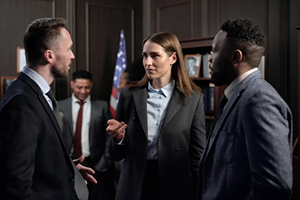Introduction
Police misconduct refers to inappropriate or illegal actions taken by police officers in connection with their official duties. When such misconduct occurs, it takes various forms, such as excessive force, wrongful arrest, false imprisonment, and other civil rights violations. Slip and fall lawyer Victims of police misconduct may seek accountable through lawsuits, aiming for justice while potentially having a lasting impact on law enforcement practices. This article explores the steps involved in pursuing police misconduct lawsuits, focusing on gaining justice and ensuring accountability.
Understanding Police Misconduct
Various actions can be classified as police misconduct. Understanding the types of misconduct that can lead to lawsuits is crucial for victims seeking justice.
Types of Police Misconduct
- Excessive Force: When officers use more physical force than is reasonable, it can lead to severe injuries or even fatalities. False Arrest: Arresting someone without probable cause or a warrant can be considered a violation of the Fourth Amendment rights. Malicious Prosecution: Initiating criminal charges based on false information, leading to court proceedings, can cause significant damage to an individual's life and reputation. Racial Profiling: Law enforcement actions based on race rather than evidence or behavior can lead to serious civil rights violations. Police Brutality: This encompasses not only excessive force but also any form of violent treatment of detainees. Negligent Hiring or Training: If a department hires officers with known issues or fails to provide adequate training, it could be liable for misconduct.
The Importance of a Personal Injury Lawyer
When approaching a police misconduct case, it is essential to have professional legal help. Personal injury lawyers specializing in this type of case can help navigate the complexities involved. Particularly in Seattle, injury lawyers familiar with local laws and precedents can significantly enhance the chances of winning a case.
What Personal Injury Lawyers Do
Personal injury lawyers play a pivotal role during the legal journey. Here are some crucial aspects of their job:

- Case Evaluation: They assess the merit of your case and advise on the best legal route to take. Investigation: Lawyers thoroughly investigate the incident, gathering all necessary evidence, from eyewitness testimonies to police reports. Negotiate Settlements: Many cases settle before reaching court; lawyers negotiate on behalf of victims to secure a fair settlement. Trial Representation: If a case goes to trial, a personal injury attorney will advocate for you in the courtroom.
Steps to File a Police Misconduct Lawsuit
Pursuing a lawsuit against police misconduct involves a series of strategic steps. Each step requires careful attention to detail and legal arguments to ensure a favorable outcome.
1. Document the Incident
Collect as much information as you can regarding the incident. This includes:
- Time and date of the occurrence.Names and badge numbers of the involved officers.Details of the misconduct, including how and why it occurred.
Ensure to take pictures of any injuries and gather contact details for witnesses who can corroborate your story. Documentation is vital for building a solid case.
2. Seek Medical Attention
If you suffered injuries due to the misconduct, seek medical attention immediately. This is essential not only for your health but also for establishing credible evidence. Obtain medical records of your injuries, as they will play a crucial role in your lawsuit.
3. Consult a Personal Injury Lawyer
Engaging a personal injury lawyer who specializes in police misconduct cases is crucial at this stage. Look for Seattle injury lawyers with proven experience and knowledge of the legal processes involved in these cases. Discuss your case in detail, providing all documentation and evidence.

4. File a Complaint
Before filing a lawsuit, most jurisdictions require victims to first file a complaint with the police department or other relevant authority. This formal process allows the department to investigate the claim internally.
Gather necessary supporting documents and ensure that you comply with all deadlines. Consult with your attorney to draft a well-structured complaint that outlines the specifics of your case and provides a basis for accountability.
5. Establish a Legal Case
With your lawyer, develop a strong legal case that illustrates the actions of the police officers constituted misconduct. This may include:
- Collecting evidenceSecuring witness testimoniesGathering expert opinionsReviewing police policies and procedures
6. Negotiation and Settlement
Once the case is established, your attorney will enter into negotiations with the police department's legal team. Having an experienced personal injury lawyer by your side is essential here, as negotiations can often lead to settlements without the need for trial.
Settlements can vary widely depending on the specific circumstances of each case, including the extent of injuries, emotional distress, and financial burdens brought on by the incident.

7. Filing a Lawsuit
If negotiations do not yield satisfactory results, your lawyer may recommend proceeding with a civil lawsuit. This legal document must comply with procedural requirements, and timing is critical, as various statutes of limitations exist concerning these claims.
Your attorney will prepare your case for court, gathering all required evidence to present a compelling argument for pursuing damages.
8. Prepare for Trial
If your case goes to trial, your lawyer will prepare you thoroughly for what to expect. Understanding the court process, potential witnesses, and the nature of your testimonies will be vital for success.
Preparation will include mock trials and reviewing facts to instill confidence and readiness for real-life proceedings.
Potential Outcomes of Police Misconduct Lawsuits
The ultimate goal of pursuing a police misconduct lawsuit is to obtain justice and potentially a financial settlement, which can serve as compensation for medical expenses, lost wages, and emotional trauma.
1. Financial Compensation
Victims might receive compensation for:
- Medical expensesPain and sufferingEmotional distressLoss of income
Financial compensation can provide much-needed support to victims struggling after instances of misconduct.
2. Policy Changes
Successful lawsuits often lead to systemic changes in law enforcement policies and training. Holding officers accountable can result in better practices across departments, fostering improved community relations.
3. Awareness and Advocacy
Pursuing justice can draw public attention to issues surrounding police misconduct, influencing public opinion and potentially prompting change. Victims may become advocates for reform, further supporting the goal of improving policing standards.
Conclusion
Pursuing a police misconduct lawsuit can be a lengthy and emotionally challenging process; however, it plays a vital role in ensuring accountability and promoting justice. By understanding the necessary steps and enlisting the help of skilled attorneys, victims can navigate their paths towards justice.
If you or someone you know has fallen victim to police misconduct, don’t hesitate to seek the assistance of personal injury lawyers. Whether you need a car accident lawyer, truck accident lawyer, or a specialized police misconduct attorney, reaching out to a skilled legal professional, such as those at Moseley Collins Law, will ensure that your case is managed with the attention and care it deserves.
In summary, being informed about your rights and understanding how to pursue justice can significantly empower victims, enabling them to seek the accountability that is essential for both personal recovery and broader social change.
Moseley Collins Law 701 5th Ave Suite 4200 Seattle, WA 98104 (800) 426-5546